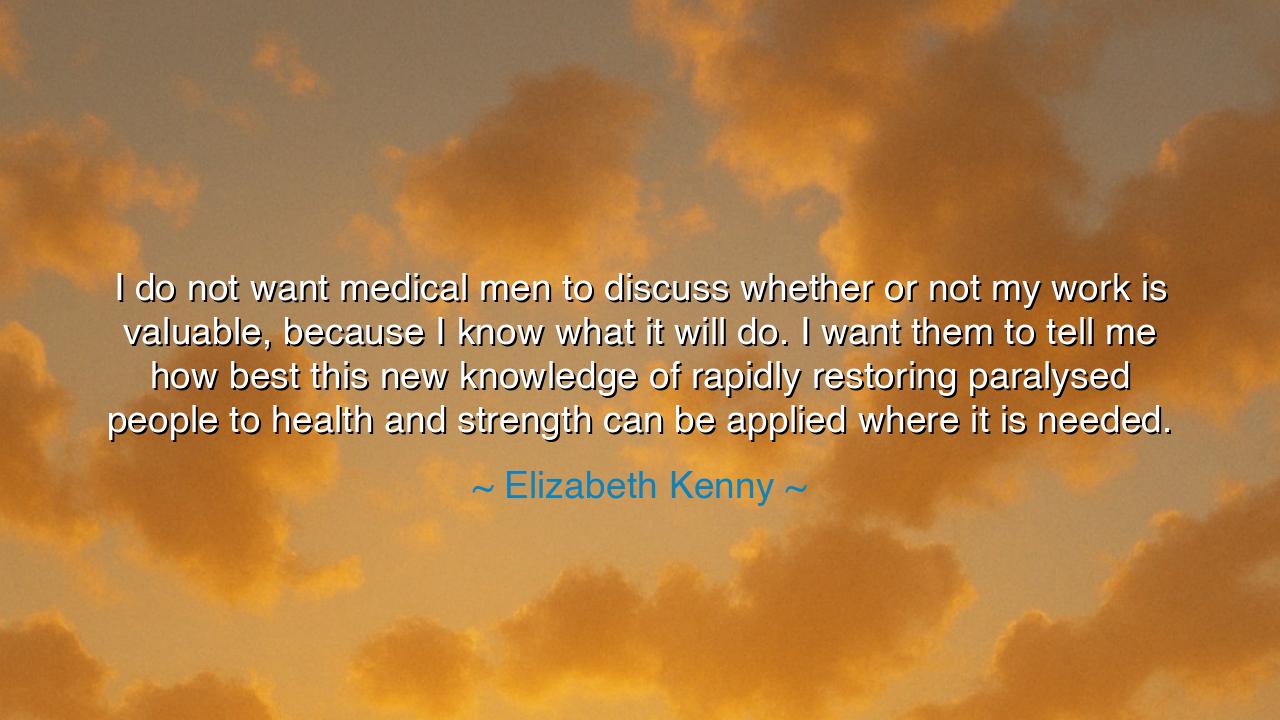
I do not want medical men to discuss whether or not my work is
I do not want medical men to discuss whether or not my work is valuable, because I know what it will do. I want them to tell me how best this new knowledge of rapidly restoring paralysed people to health and strength can be applied where it is needed.






In the annals of courage and conviction, few voices ring with the quiet thunder of Elizabeth Kenny, the healer who defied the boundaries of convention to bring light where others had resigned to darkness. She once declared: “I do not want medical men to discuss whether or not my work is valuable, because I know what it will do. I want them to tell me how best this new knowledge of rapidly restoring paralysed people to health and strength can be applied where it is needed.” These words, like a sword of flame, cleave through the hesitation of bureaucracy and pride. They speak not of doubt, but of faith — faith in truth tested by compassion, and in knowledge proven by the healing of the broken.
To understand her spirit, one must see the world from which she arose. In the early twentieth century, poliomyelitis — the dreaded polio — stalked the earth like a shadow upon children. Its victims were left paralysed, often confined to twisted limbs and lifeless hope. The learned physicians of her day prescribed immobility, binding limbs in plaster and stillness. But Sister Kenny, as she was known, looked upon her patients not as specimens, but as souls. She saw vitality flickering beneath their paralysis, the life-force still striving to move. Guided by intuition and mercy, she devised new methods — warm compresses, gentle movement, and the constant encouragement of the spirit. And she watched the once-paralysed rise again.
But her triumph was not met with applause. The guardians of traditional medicine — the medical men she spoke of — dismissed her methods as folly, her results as accident. Yet she stood unbowed, knowing that truth does not await permission to exist. Her declaration, then, is the cry of the visionary: “I do not ask if it is valuable — I know what it will do.” She spoke as one who had seen life restored with her own eyes, and her only desire was to see it multiplied — to bring healing where it was needed, not debated in halls of pride.
The ancients would have understood her well. For when Archimedes leapt from his bath shouting “Eureka!”, or when Hippocrates defied superstition to study the body as a sacred vessel of nature, they too were met with scorn. Every age has its healers who stand alone against the tides of disbelief. What Elizabeth Kenny carried was not arrogance, but certainty born of compassion — the kind that flows not from theory, but from the sight of suffering eased and life renewed. Hers was the sacred rebellion of the healer’s heart, which values the patient’s breath over the applause of the learned.
In her words lies a deeper wisdom for all generations: that knowledge is not to be hoarded, but to be used. What worth has discovery if it remains confined to argument and ego? The purpose of truth is not victory in debate, but service in action. To know how to restore the broken and to delay that power in fear or pride — that is a sin against life itself. Kenny’s demand was not for praise, but for application — that those who could amplify her gift should do so swiftly, for every hour lost was another life condemned.
There is also in her voice a challenge to the spirit of all who labor for progress: do not wait for the world’s permission to do what is right. The one who knows the power of their truth must bear it forward, even against doubt and derision. For the history of mankind is written not by those who hesitated, but by those who believed before others understood. Sister Kenny’s faith in her method, like Prometheus stealing fire from the gods, brought warmth and strength back to countless lives. Her struggle reminds us that new light often enters the world through the cracks of rejection.
And so, let this be the teaching for those who walk the path of purpose: when you hold a truth that brings healing, hope, or goodness, speak it boldly and act upon it. Do not waste your flame in convincing the blind; shine it instead upon those who can see. If the world doubts you, let your results answer in silence. For service is the language of truth, and time itself will bear witness to what is genuine.
Thus, remember the legacy of Elizabeth Kenny: that conviction, when joined with compassion, becomes unstoppable. Her life teaches that the measure of wisdom lies not in its approval, but in its impact. Seek not to be celebrated, but to be useful. For in the end, the true healer — whether of bodies, minds, or hearts — asks not, “Will they believe me?” but rather, “How can this gift be brought swiftly to those who suffer?” And in that question lies the eternal calling of every soul who dares to change the world.






AAdministratorAdministrator
Welcome, honored guests. Please leave a comment, we will respond soon